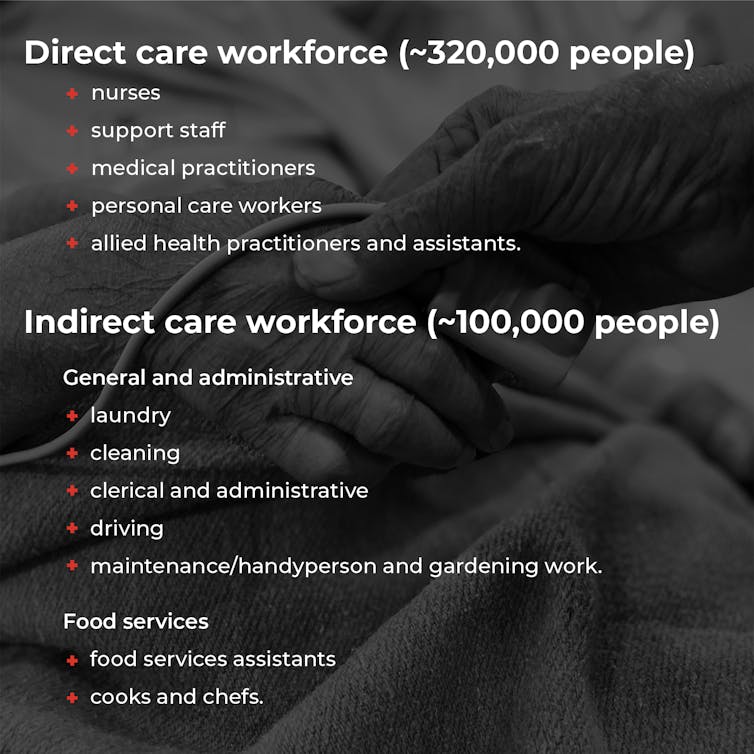Aged care workers have won a huge pay rise. What about the cleaners, cooks and admin staff who support them?
- Written by Matthew Xerri, Senior Lecturer in Human Resources, Griffith University

This month, the Fair Work Commission handed Australia’s aged care workforce an historic pay rise[1], with some groups’ wages set to increase by more than 28%.
The news was a welcome relief for much of the female-dominated workforce, who have faced chronic staffing shortages and poor rates of pay[2] in recent years.
But not everyone working in the aged care industry was counted equally.
A whole host of workers essential to running aged-care facilities – such as cooks, cleaning staff and administrative assistants – are included in what’s called the indirect care workforce[3]. Many of them will get a raise of just 3%.
Australia now risks continuing to leave behind this hardworking and often overlooked group.
Who gets more
Most direct care workers on the Aged Care Award – such as nurses and care staff – will see a big pay increase from July this year, inclusive of an interim 15% raise [4] awarded in 2023.
For example, workers on Level 3 of the award will see an overall wage increase of approximately 23% year over year, while workers on Level 5 (holding Certificate 4 in Aged Care and Disability) will see their pay go up by 28.5%.
Experienced nursing assistants on the new Aged Care Award will also receive a pay increase of 23%.
Who gets left behind
Running an aged care facility is a multifaceted operation. Approximately 100,000 residential aged care workers[5] are in “indirect care” roles, working across administrative and clerical services, food services, and laundry.
In its decision[6], the commission ruled that a “fundamental difference” between the work of direct and indirect care workers meant they did not deserve an equal pay increase.
Without diminishing the importance of the work of indirect care for the proper functioning of residential aged care facilities, the above workers do not perform work equivalent in value to the direct care workers.
For many workers in the areas of infection prevention and control, as well as some indirect workers in dementia wards, it awarded a pay increase of just 3%.
Other segments of the indirect care workforce received greater recognition. Laundry hands, cleaners and food service assistants who interact directly with residents saw this extra contact acknowledged, and won a raise of about 7%.
By influencing attitudes at work, the pay divide could also be exerting a profound influence on the quality of care delivered.
BaptistCare NSW & ACT has shared anecdotal reports[12] that indirect care staff have become less willing to assist their higher paid colleagues.
Australia cannot afford further negative influences on its aged care sector.
It hasn’t been long since the Royal Commission into Aged Care found[13] the “unkind and uncaring” system had failed to meet the needs of elderly people, and could even be neglecting them.
Pay rises for direct care workers are an important step in improving the quality of our aged care offering. But we could risk it all if we continue to leave part of its workforce behind.
Read more: Who will look after us in our final years? A pay rise alone won't solve aged-care workforce shortages[14]
References
- ^ historic pay rise (www.abc.net.au)
- ^ chronic staffing shortages and poor rates of pay (theconversation.com)
- ^ indirect care workforce (www.agedcareguide.com.au)
- ^ an interim 15% raise (www.fwc.gov.au)
- ^ 100,000 residential aged care workers (helloleaders.com.au)
- ^ decision (www.fwc.gov.au)
- ^ said (www.fwc.gov.au)
- ^ CC BY-SA (creativecommons.org)
- ^ current Australian inflation rate (www.rba.gov.au)
- ^ fell by about 6% (www.theweeklysource.com.au)
- ^ Dean Lewins/AAP (photos.aap.com.au)
- ^ anecdotal reports (www.theweeklysource.com.au)
- ^ Royal Commission into Aged Care found (www.abc.net.au)
- ^ Who will look after us in our final years? A pay rise alone won't solve aged-care workforce shortages (theconversation.com)
Authors: Matthew Xerri, Senior Lecturer in Human Resources, Griffith University







